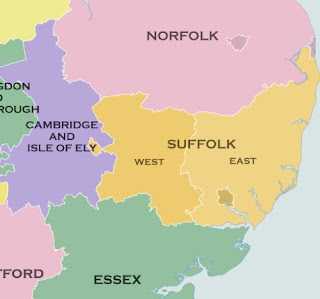One of the paradoxes of genealogy is that although it may be hard to find information on recent ancestors, it may be easier to find information on much older ancestors because more people are descended from them and have already done research. Such is the case with my well-documented earliest immigrant ancestors, Richard Woodward and his wife, Rose Stewart Woodward.
Richard and Rose left England for the Massachusetts Bay Colony in 1634, as mature adults with Richard 45 and Rose 50 years old, as seen in the lower half of the book excerpt to the left (The Planters of the Commonwealth of Massachusetts by Charles Edward Banks). Their 13-year-old sons, George and John, accompanied them on the 2-month voyage which left Ipswich, Suffolk County, England on April 30, 1634 aboard the ship “Elizabeth,” undoubtedly named for the famous monarch who died in 1603. What could have motivated them to undertake such a dramatic move to the colonies at their age?
Richard, my 9th great grandfather, was probably born in Childwell Parish, Lancashire County, in northwest England, in 1587 or 1589. He was a miller and married Rose Stewart in Cambridge, East England, in 1614. Richard already demonstrated a willingness to move to the other side of the county at the age of 25 for his bride.
Rose was older than Richard, having been born in 1582 in Cambridgeshire County, where the young family started their future. Cambridgeshire County is just to the west of Suffolk County, where the family departs from in 1634, so it is likely that adjacent Suffolk County and its busy port of Ipswich on the River Orwell were familiar to the couple Richard and Rose. It is easy to imagine that they could have arranged their ship passage without great effort.
What could have motivated them to make such a move? While I did not find direct evidence for this couple, looking at Ipswich and the political chaos of the time, it is not hard to deduce a likely scenario.
Ipswich was a main port in East Anglia (the eastern part of England) and was a key port for imports and exports. It also had an excellent reputation for printing and books at that time. In the 1630’s, Ipswich was one of the principal embarkation points for East Anglican Puritans leaving England for the Massachusetts Bay Colony, which came to be known as the “Great Migration.” Puritans opposed Church of England practices that too closely resembled Roman Catholicism.
After his father King James I of England died in 1625 and Charles I became king, England’s religious conflict worsened and political chaos was added to the mix as Charles and Parliament sparred openly over fiscal debt, new unpopular taxes, Charles’ belief in the Divine Right of Kings, and rising tensions with Scotland. This conflict and chaos accelerated emigration to the New World. The chaos did not end well for Charles I, as he was tried by Parliament and executed in 1649.
So Richard and Rose likely left England, as many of their contemporaries, for religious and political reasons and to begin afresh in the New World even if they were on the older side. After the two-month voyage, the “Elizabeth” docked in Boston Harbor in July 1634. The couple settled in Watertown, MA, about 10 miles to the west of Boston, where they lived until Rose’s death in 1662 at the age of 80.
The year following their arrival in Watertown, Richard took the “Oath of a Freeman,” with its commonwealth references and no mention of a king in the text, and completed his break with the English monarchy.
Through their son George’s offspring, the break with the monarchy would be further manifested and it only took four generations. George’s son John (1649-1732) also had a son John (1675-1767). The last John had a son Deliverance Woodward (1713-1783) who fought in the American Revolution and was known as “Ensign Woodward” in his Hanover, New Hampshire hometown. Deliverance’s young son, Jonathan (1762-1843) also fought in the Revolution so there were two patriots from this line, leaving no doubt about the Woodwards’ break with the English monarchy.








